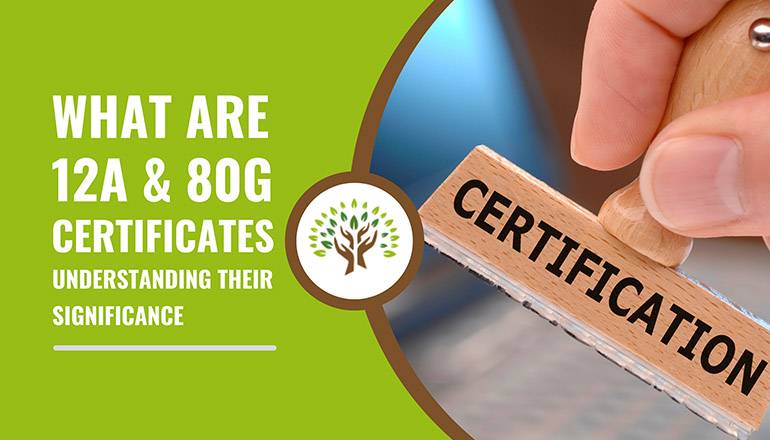By:Sakshi |
Updated on:Jun 30, 2025 |
Category:12a and 80g

In the realm of non-profit organizations in India, 12A and 80G certificates play a pivotal role. These certifications not only enhance the credibility of an NGO but also provide substantial tax benefits. Understanding the significance of 12A and 80G certificates is essential for any organization aiming to operate efficiently and attract donors. This article delves into what these certificates are, their benefits, and the process of obtaining them.
12A and 80G certificates are provisions under the Indian Income Tax Act that grant tax exemptions and benefits to non-profit organizations. These certificates are crucial for NGOs, charities, and other similar entities to operate smoothly and maximize their fundraising efforts.
The 12A certificate is granted to an organization that seeks to be recognized as a charitable entity under the Income Tax Act. This certification allows the organization to receive tax-exempt donations and ensures that the income derived from its activities is exempt from taxation, provided it adheres to the guidelines set forth by the government.
The 80G certificate complements the 12A certificate by enabling donors to claim tax deductions on their contributions to the organization. This incentive encourages more donations, as donors can reduce their taxable income by a certain percentage of their contribution, making charitable giving more attractive.
Understanding the 12A and 80G certificates is vital for several reasons. These certificates not only provide financial benefits but also enhance the organization’s reputation and trustworthiness.
One of the primary advantages of obtaining 12A and 80G certificates is the tax exemption they offer. With a 12A certificate, an NGO can ensure that its income is not subject to income tax, provided it uses the funds for its charitable activities. This exemption allows the organization to allocate more resources towards its mission rather than paying taxes.
Holding 12A and 80G certificates significantly boosts an NGO’s credibility. Donors are more likely to contribute to an organization that is officially recognized and offers tax benefits. The 80G certificate, in particular, provides donors with the assurance that their contributions are legitimate and can be deducted from their taxable income.
With the combination of 12A and 80G certificates, NGOs can attract more donors. The tax benefits associated with these certificates make donations more appealing, thereby increasing the overall fundraising potential. This increased funding can be pivotal in expanding the organization’s programs and initiatives.
Obtaining 12A and 80G certificates ensures that an organization complies with the legal requirements set by the Indian government. This compliance not only avoids potential legal issues but also reinforces the organization’s commitment to transparency and accountability.
Securing 12A and 80G certificates involves a structured application process. Here’s a step-by-step guide to help organizations navigate the process:
Before applying for the certificates, an organization must be registered as a trust, society, or a Section 8 company. This registration is a prerequisite for obtaining 12A and 80G certificates.
Maintaining detailed financial records and documentation of activities is crucial. The organization must demonstrate that it operates exclusively for charitable purposes and adheres to the guidelines stipulated under the Income Tax Act.
To obtain the 12A certificate, the organization must submit Form 10A along with the required documents to the Commissioner of Income Tax (Exemption). This includes the organization’s registration details, financial statements, and a detailed account of its activities.
After obtaining the 12A certificate, the organization can apply for the 80G certificate by submitting Form 10G. This application requires additional documentation, including the organization’s financial statements and proof of its charitable activities.
Once granted, the 12A and 80G certificates must be renewed periodically. Organizations must ensure ongoing compliance with the Income Tax Act by maintaining transparent records and adhering to the stipulated guidelines to retain their tax-exempt status.
The benefits of 12A and 80G certificates extend beyond tax exemptions and increased donations. These certifications contribute to the overall growth and sustainability of non-profit organizations.
With the tax exemptions provided by the 12A certificate, NGOs can achieve greater financial stability. The reduced tax burden allows more funds to be directed towards the organization’s core activities, ensuring sustained impact.
Organizations holding 12A and 80G certificates often enjoy enhanced visibility and a stronger reputation in the philanthropic sector. This recognition can open doors to partnerships, grants, and other funding opportunities that might otherwise be inaccessible.
The assurance that donations are tax-deductible through the 80G certificate builds donor confidence. Donors are more likely to contribute to organizations where they can see tangible tax benefits, leading to increased and sustained funding.
With the financial and reputational benefits of 12A and 80G certificates, NGOs can strategically plan for growth. Access to more funds and enhanced credibility enable organizations to expand their programs, reach a larger audience, and create a more significant impact.
Understanding 12A and 80G certificates is essential for any non-profit organization in India aiming to thrive and make a meaningful impact. These certificates provide substantial tax benefits, enhance donor trust, and ensure legal compliance, all of which are crucial for the sustainable growth of an NGO. By securing 12A and 80G certificates, organizations can focus more on their mission and less on financial constraints, ultimately contributing to a more charitable and supportive society.
Q1: What are the benefits of having a 12A certificate?
Ans1: A 12A certificate provides tax exemption on income, allows donations from foreign sources, and enhances credibility.
Q2: Can an organization have both 12A and 80G certificates?
Ans2: Yes, an organization can have both certificates, as they serve different purposes.
Q3: What is the validity period of the 80G certificate?
Ans3: The 80G certificate is typically valid for a period of 2 to 5 years and needs to be renewed.
Q4: Can individuals claim tax deductions for donations without an 80G certificate?
Ans4: No, individuals can only claim tax deductions if the organization has an 80G certificate.
Q5: Are religious institutions eligible for 12A and 80G certificates?
Ans5: Yes, religious institutions engaged in charitable activities can apply for these certificates.

I am a dedicated and detail-oriented Website Content Writer with over two years of experience in creating compelling, reader-friendly, and SEO-optimized content. My expertise lies in developing well-structured web pages, landing pages, blogs, and service descriptions that enhance user engagement and drive organic traffic.